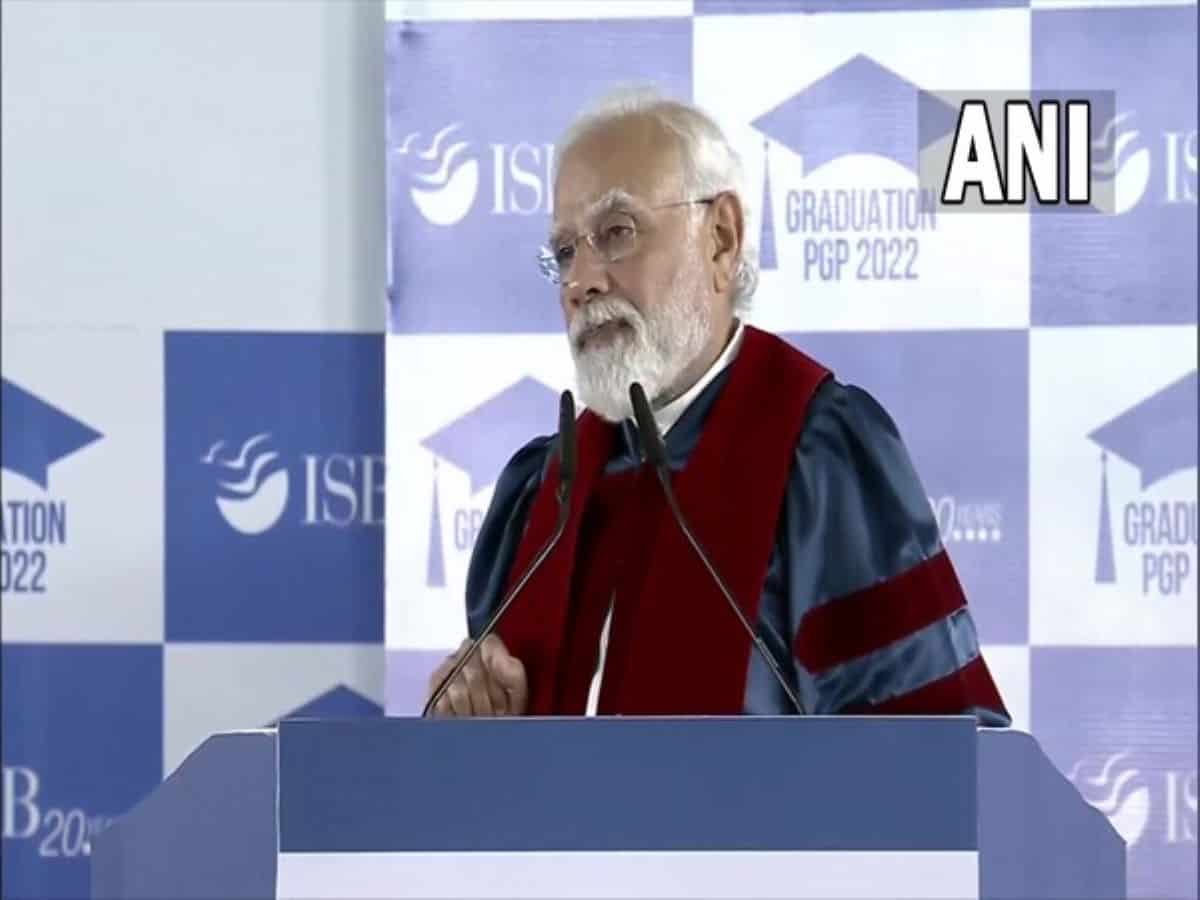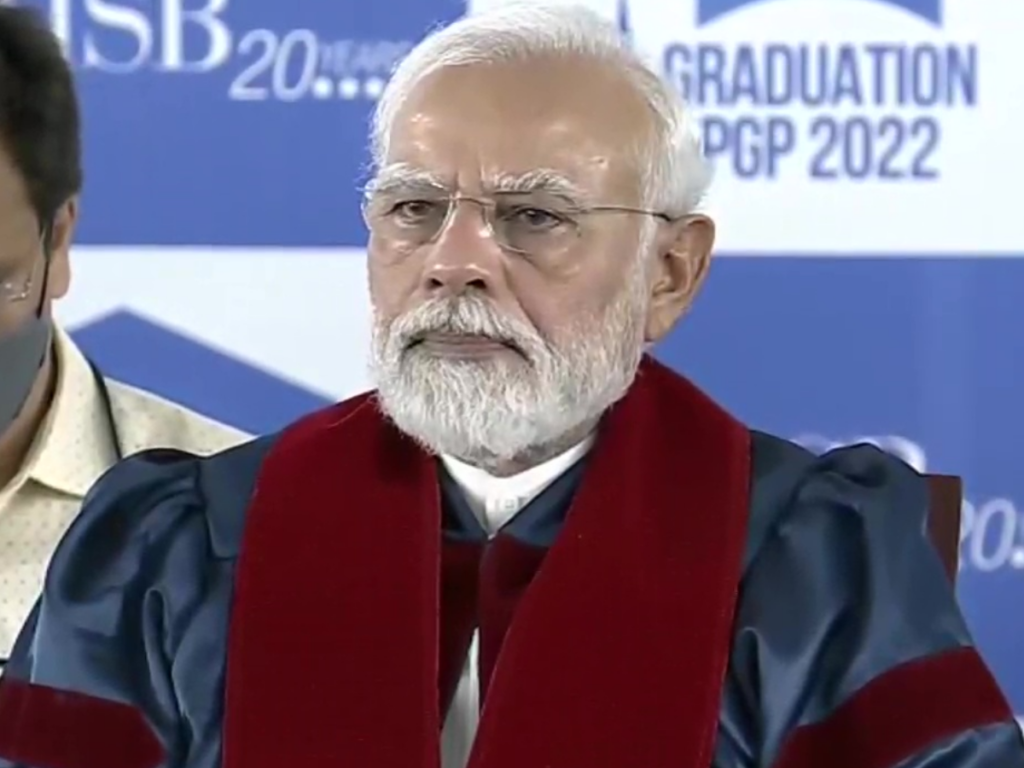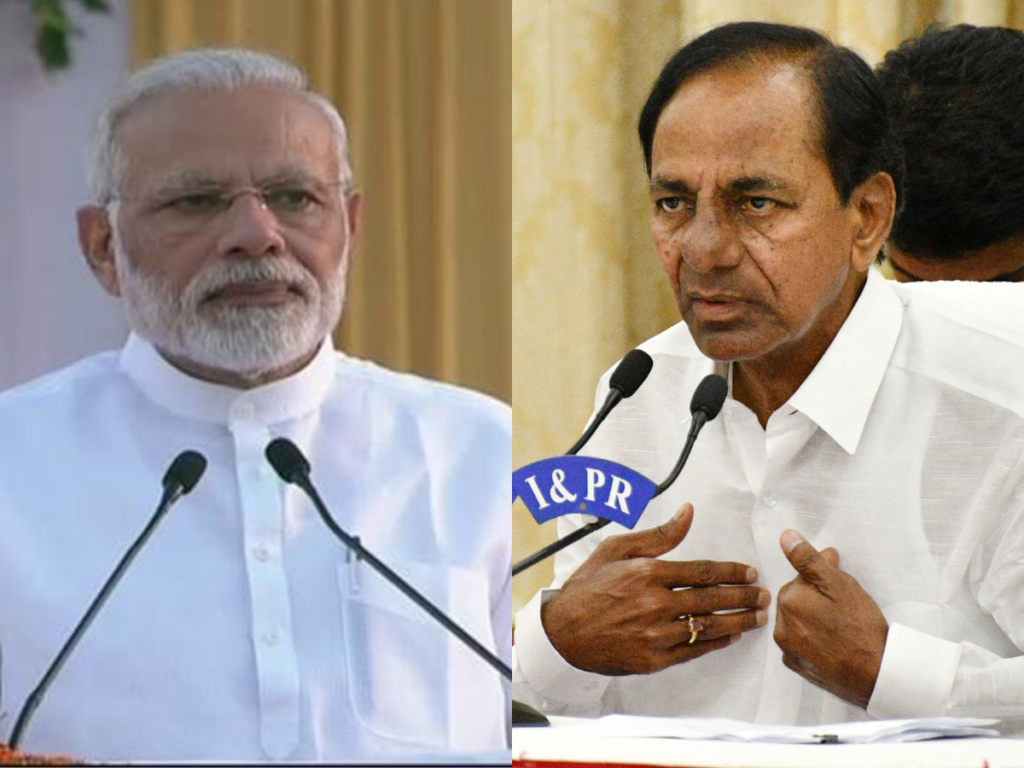

The visit of Prime Minister, Narendra Modi on Thursday to address the convocation of the Indian School of Business (ISB) and also commemorating its 20th year has raised both heightened interest and controversy.
Interest because the globally recognised B School is looking ahead for the next decade of growth. It has a new Dean in Prof Madan Pillutla, an expert in Organisational Behaviour who took over in mid 2021. After grappling with the challenges of the Pandemic, he is involved in formulating new directions. The PM’s visit is expected to give the necessary momentum.
Modi’s visit was to deliver the convocation address to the students of the ISB’s flagship Post Graduate Programme 2022 and present medals. However, the conspicuous absence of the Telangana State Chief Minister, K Chandrasekhar Rao at the important event raised a controversy in the political circles too.

The Telangana CM was holding discussions with former PM, Deve Gowda and his son, H D Kumaraswamy ( former Karnataka CM) in Bengaluru, even as the PM was talking about the need for innovative leadership for the country. Coincidentally, KCR’s high profile son & IT minister, KT Rama Rao (away in Davos representing State), a regular at the ISB events was also absent. ‘Given the recent strain in the relations between Modi and KCR and the later avoiding meetings, the development raised a storm across the country.

For Hyderabad, the ISB has emerged as an important addition. It has enriched the rich and diverse academic milieu of Institutions of Science, Universities, Agricultural, Space, Defence, linguistic and global organisations. The high profile B School has grown and expanded well in these two decades. It figures in the top rung in the Asian rankings and it’s contributions are recognised globally.
I had the privilege of covering the first press conference in 2001 by the founder Dean Dr Pramath Sinha announcing the inaugural one-year course and the vision and offerings of the ISB. The building, the facilities were very attractive and imposing. The fee structure was quite steep.
Incidentally, that was the phase when Hyderabad was attracting global attention thanks to the Chief Minister, Nara Chandrababu Naidu’s obsessive ‘Come to Hyderabad’ call/song, to global industry/ Institutes and organising road shows abroad and offering concessions.
Hyderabad had the conducive environment, nice climate, multicultural society and strong political leadership. The Hitech City building was ready, Microsoft had come, the International Institute of Information Technology (IIITH) was shaping up, the ICICI Knowledge Park was in place, many international IT giants were evincing interest to set up shop.
The beginning
The ISB was the brain child of Mr Rajat Gupta and Mr Anil Kumar, two McKinsey stalwarts. They had conceptualised the idea sometime in 1996. Naidu, ever hungry for ideas and opportunities seized on the concept. With the help of some Indian Industrialists like Adi Godrej, Anil Ambani and others, the CM took the initiative and worked on the proposal. The ISB was given prime land in 1998. It soon took shape and the then PM, Atal Bihari Vajpayee (in whose NDA Govt. Naidu’s TDP was a key partner) inaugurated it in 2001.
In its formative phase, the ISB forged partnerships with international business schools like Wharton and Kellogg. From then on the ISB has not looked back. It has grown in strength. It attracts students and professionals intending to upgrade their management skills every year in thousands of whom a few hundred get selected.
The Institute mostly catered to the richer sections due to the high fee structure. Despite, it not getting the AICTE recognition, ISB managed to grow, with the backing of industries and students getting placements. It’s specialised courses were a big draw. Essentially because of the international faculty. The regular participation of industry captains in lectures and special sessions proved invaluable.
The journey was not all rosy though. The comparisons with the IIMs in Ahmadabad, Kolkata, Bengaluru, the comparative fee structures and competition echoed and the ISB had to contend with it. Then came the rather tough developments from 2008-09, when the then Dean, Prof Mendu Rammohan Rao had to resign following the Satyam Scam. Prof Rao had taken over from Pramath Sinha in 2004. He was on the board of Ramalingam Raju’s Satyam Computers.
Then came the development surrounding the founder chairman, Rajat Gupta around 2011. Having risen dramatically to head McKinsey, Gupta was convicted of charges of insider trading and served a prison sentence. In 2011, he was succeeded by Adi Godrej.
Luminaries at convocation
Every year, the convocation, generally in April attracts a luminary from different field to deliver the address and present the degrees. From former Presidents– A P J Abdul Kalam, Pranab Mukherjee, Ms Pratibha Patil to former PM, Dr Manmohan Singh to industrialists–Ratan Tata to Naryana Murthy have addressed the students. In 2006, the US President, George W Bush Jr. also addressed a special meeting in the ISB.
Controversy and criticism
The ISB has also attracted sharp criticism. There was a controversy on how it could be given the Indian tag in the name, being a totally private enterprise. Similarly, it had to defend the very high fee structure. Though, banks like the HDFC and other extended loans. From being elitist to questions about its contribution to the growth of management practices within the country, the ISB has been questioned. It has been weathering these minor storms and growing.
For several years, when salary packages were the most talked about, we as Journalists from Hyderabad would draw comparisons of offers to ISB and IIM A or other B Schools vis a vis the fee structure etc. It would lead to discussions and criticisms and terming it unequal comparisons etc. before the practice of naming the students with top packages was discontinued to avoid unhealthy fallout.
While a majority of the graduates fly out to MNCs with huge packages, there are a good number of mid career professionals and representatives from families of industry groups who sharpen their skills at the ISB and go back to enrich their parent enterprises.
In 2010, the ISB got its second campus in Mohali on the outskirts of Chandigarh. In 2012, the then CM of Punjab, Prakash Singh Badal inaugurated it. Into its 10th year now, the Mohali campus too is expanding. Over the past 20 years, a handful of my friends have graduated from the ISB Hyderabad and are doing well. Had the opportunity to actively participating in several events at the impressive Khemka Auditorium, including moderating a session on ‘Women in Politics and development’ in 2019 with Ms Kavita Kalvakuntla, then an MP of the Telangana Rastra Samithi. The event was organised by the students of Public Policy.
The ISB has benefited through liberal grants from Industrialists across the country, from Bharti Mittal, Srini Raju, Max Health, BVR Mohan Reddy etc. It’s faculty too has been a mix of sound academics from India and abroad. Very recently, one of them, Krishnamurthy Subramanian served as the Chief Economic Adviser to the NDA Government.



